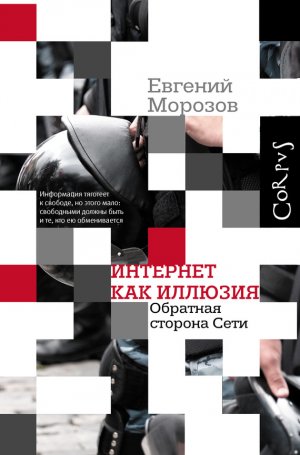Интернет как иллюзия. Обратная сторона сети Морозов Евгений

FBI Backs Record-Keeping on Prepaid Cell Phones // Associated Press, July 31, 2010.
George-Cosh, D. Blackberry Maker Silent on UAE Security Talks // National (Abu Dhabi), July 29, 2010.
Google: Critics of Vietnam Mine Face Online Attack // Associated Press, March 31, 2010.
Google Says Vietnam Mine Opponents Under Cyber Attack // BBC News, March 31, 2010.
Government to Banish Unbranded Mobile Phones // SiliconIndia, July 14, 2010.www.siliconindia.com/shownews/Government_to_banish_ unbranded_mobile_phones_-nid-69662.html.
Graham, S., and D. Wood Digitizing Surveillance: Categorization, Space, Inequality // Critical Social Policy 23, no. 2 (2003): 227. Heintz, J. Text Messages Warn of Violence in Belarus // Associated
Press, March 18, 2006.
Helft, M. Google Uses Web Searches to Track Flu’s Spread // New York Times, November 11, 2008.
Hille, K. Censorship Fears Grow as IBM Tool Bolsters Chinese Spam Curb // Financial Times, March 25, 2010.
Hille, K. Censorship Fears over China Spam Curb // Financial Times, March 24, 2010.
Hille, K. China Bolsters Internet Censors’ Scrutiny // Financial Times, January 5, 2009.
Holland, H. B. Privacy Paradox 2.0 // 19 Widener Law Journal 893 (2010).
Home Office Targets Terror-Related Websites // BBC News, February 1, 2010.
Huber, M., Kowalski, S., Nohlberg, M., and S. Tjoa To-wards Automating Social Engineering Using Social Networking Sites / In: 2009 International Conference on Computational Science and Engineering, 117–124.
India Bans Chinese Telecom Equipment // Associated Press, April 30, 2010. Iran’s Police Vow No Tolerance Towards Protesters // Reuters, Febru-ary 6, 2010.
Johnson, C. Y. Project “Gaydar”: An MIT Experiment Raises New Questions About Online Privacy // Boston Globe, September 20, 2009.
Jonietz, E. Augmented Identity // Technology Review, February 23,
2010. www.technologyreview.com/computing/24639/?a=f. Kazmin, A. Police Threaten Kashmiri Facebook Users // Financial
Times, July 19, 2010.
Kirk, J. Vietnam Rebuffs Hacking Claims from Google // IDG News Service, April 6, 2010.
Krishna, Jai India Minister: Security Agencies Have Concerns over Blackberry Services // Wall Street Journal, July 27, 2010.
Lemos, Robert Your Groups Tell Hackers Who You Are // Technology Review, July 23, 2010. www.technologyreview.com/printer_friendly_ article.aspx?id=25852&channel=web§ion=.
Lukyanenko, Peter, and Cathy Young Tricks of the KGB trade // Harper’s Magazine, January 1992.
Mayer-Schonberger, Viktor Delete: The Virtue of Forgetting in the Digital Age. Princeton, NJ: Princeton University Press, 2009.
McMillan, Robert Activists Worry About a New “Green Dam” in Vietnam // IDG News Service, June 4, 2010.
Morar, Natalia Blog for Democracy, from the Streets of Moldova // Open-Democracy, April 8, 2009. www.opendemocracy.net/arti-cle/email/blog-for-democracy-from-the-streets-of-moldova.
Mumford, Lewis The Pentagon of Power. New York: Harcourt Brace Jovanovich, 1974.
Nigeria: New Policy on Mobile Phone SIM Cards // Daily Trust, Janu-ary 11, 2010. allafrica.com/stories/201001110286.html.
Note to Readers // New York Times, September 13, 2009. www.nytimes. com/2009/09/13/business/media/13note.html?_r=1.
Owad, Tom Data Mining 101: Finding Subversives with Amazon Wishlists // Applefritter, January 4, 2006. www.applefritter.com/ bannedbooks.
P2P Comes to the Aid of Audiovisual Search // PhysOrg.com. Novem-ber 18, 2009. www.physorg.com/news177780052.html.
Page, Lewis NSA Offering “Billions” for Skype Eavesdrop Solution // Register, February 12, 2009. www.theregister.co.uk/2009/02/12/ nsa_offers_billions_for_skype_pwnage/.
Palmer, Maija Face Recognition Software Gaining a Broader Can-vas // Financial Times, May 22, 2010.
Palmer, Maija Google Debates Face Recognition Technology After Privacy Blunders // Financial Times, May 20, 2010.
Peterson, Kristina Intelligence Agents Borrow Wall Street Trading Technology // Wall Street Journal, May 28, 2010.
Scheck, Justin Stalkers Exploit Cellphone GPS // What They Know series, Wall Street Journal, August 3, 2010.
Sharma, A. Cyber Wars: A Paradigm Shift from Means to Ends // Stra-tegic Analysis 34, no. 1 (2010): 62–73.
Simonite, Tom Surveillance Software Knows What a Camera Sees // Technology Review, June 1, 2010. www.technologyreview. com/computing/25439/?a=f.
Soar, Daniel Short Cuts // London Review of Books, August 14, 2008. Soghoian, Christopher Caught in the Cloud: Privacy, Encryption, and Government Back Doors in the Web 2.0 Era // Journal
of Telecommunications and High Technology Law, August 17, 2009.
Soghoian, Christopher Exclusive: Widespread Cell Phone Lo-cation Snooping by NSA? // Surveillance State, CNET News, September 8, 2008. news.cnet.com/8301-13739_3-10030134-46. html?tag=mncol;h2.
Solove, Daniel J. The Digital Person: Technology and Privacy in the Information Age. Ex Machina. New York: New York University Press, 2004.
Solove, Daniel J. Do Social Networks Bring the End of Privacy? // Scientific American, September 2008.
Solove, Daniel J. I’ve Got Nothing to Hide and Other Misunder-standings of Privacy // San Diego Law Review 44 (2007): 745. Solove, Daniel J. Understanding Privacy. Cambridge, MA: Harvard
University Press, 2008.
Sternstein, Aliya Lawmaker Questions White House Official’s Use of Gmail // Nextgov, April 12, 2010. www.nextgov.com/next-gov/ng_20100412_6003.php.
Stone, Brad T. M. I.? Not for Sites Focused on Sharing // New York Times, April 22, 2010.
Timmons, Heather India Wary of Chinese Telecom Equipment // New York Times, April 30, 2010.
Vietnam: Farmers to Get Free Computers in Plan to Boost Production // Thai Press Reports, April 14, 2010.
Vietnam Launches Own Social Network Site // Agence France-Presse, May 22, 2010.
Vietnam Politics: A State-Run Social Networking Website Is Launched // EIU ViewsWire, June 7, 2010.
Vietnam Steps Up China-Style Internet Control // Agence France-Pres-se, July 1, 2010.
Villeneuve, Nart, and Greg Walton “0day”: Civil Society and Cyber Security. Malware Lab, October 28, 2009. malwarelab. org/2009/10/0day-civil-society-and-cyber-security/.
Wells-Dang, A. Political Space in Vietnam: A View from the “Rice-Roots” // Pacific Review 23, no. 1 (2010): 93–112.
Wigglesworth, Robin UAE Comments Raise Fears of Crackdown on Black-Berry // Financial Times, July 26, 2010.
Wines, Michael In Restive Chinese Area, Cameras Keep Watch // New York Times, August 2, 2010.
Wondracek, G., Holz, T., Kirda, E., Antipolis, S., and
C. Kruegel A Practical Attack to De-Anonymize Social Net-work Users / In: 2010 IEEE Symposium on Security and Privacy, 223–238. 2010.
Young, Martin J. Vietnam Strengthens Firewall // Asia Times On-line, June 19, 2010. www.atimes.com/atimes/Global_Economy/ LF19Dj03.html.
Zetter, Kim Tor Researcher Who Exposed Embassy E-mail Passwords Gets Raided by Swedish FBI and CIA // Threat Level, Wired, No-vember 14, 2007. www.wired.com/threatlevel/2007/11/swedish-researc/.
Agre, P. E. The Practical Republic: Social Skills and the Progress of Citi-zenship // Community in the Digital Age: Philosophy and Practice (2004): 201–223.
Alexander, M. G., and S. Levin Theoretical, Empirical, and
Practical Approaches to Intergroup Conflict // Journal of Social Is-sues 54, no. 4 (1998): 629–639.
Alinsky, Saul David Rules for Radicals: A Practical Primer for Re-alistic Radicals. New York: Vintage Books, 1989.
Arguello, J., Butler, B. S., Joyce, E., Kraut, R., Ling,
K. S., Ros, C., and X. Wang Talk to Me: Foundations for Successful Individual-Group Interactions in Online Communities / In: Proceedings of the SIGCHI Conference on Human Factors in Computing Systems, 968. 2006.
Bakardjieva, M. Virtual Togetherness: An Everyday-Life Perspective //
Media, Culture & Society 25, no. 3 (2003): 291.
Bargh, J. A., and K. Y. McKenna The Internet and Social Life //
Annual Review of Psychology 55 (2004): 573.
Beenen, G., Ling, K., Wang, X., Chang, K., Frankowski, D.,
Resnick, P., and R. E. Kraut Using Social Psychology to Mo-tivate Contributions to Online Communities / In: Proceedings of the 2004 ACM Conference on Computer Supported Cooperative Work, 221. 2004.
Bennett, Drake Protesters’ Secret: They’re Out There Because It
Makes Them Happier // Boston Globe, October 11, 2009.
Bennett, W. L. Changing Citizenship in the Digital Age. Cambridge, MA: MIT Press, 2008.
Bennett, W. Communicating Global Activism // Information, Com-munication & Society 6, no. 2 (2003): 143–168.
Billig, M., and H. Tajfel Social Categorization and Similarity in Intergroup Behaviour // European Journal of Social Psychology 3, no. 1 (1973): 27–52.
Bimber, B., Flanagin, A. J., and C. Stohl Reconceptualizing Collective Action in the Contemporary Media Environment // Communication Theory 15, no. 4 (2005): 365–388.
Blears, James Information Revolution Breathes Life into Alliance of Youth Movements // Fox News, October 18, 2009.
Borgmann, Albert Technology and the Character of Contempo-rary Life: A Philosophical Inquiry. Chicago: University of Chicago Press, 1987.
Bornstein, G., Crum, L., Wittenbraker, J., Harring, K., Insko, C. A., and J. Thibaut On the Measurement of Social Orientations in the Minimal Group Paradigm // European Journal of Social Psychology 13, no. 4 (1983): 321–350.
Boudreaux, Richard Rent-a-Crowd Entrepreneurs in Ukraine Find People Fast to Cheer or Jeer for Any Cause // Wall Street Jour-nal, February 5, 2010.
Bratich, Jack Z. The Fog Machine // CounterPunch, June 22, 2009. www.counterpunch.org/bratich06222009.html.
Chidambaram, L., and L. L. Tung Is Out of Sight, Out of Mind? An Empirical Study of Social Loafing in Technology-Supported Groups // Information Systems Research 16, no. 2 (2005): 149.
Chin, M. G., and C. G. McClintock The Effects of Intergroup Discrimination and Social Values on Level of Self-Esteem in the Minimal Group Paradigm // European Journal of Social Psycho-logy 23, no. 1 (1993): 63–75.
Christopherson, K. M. The Positive and Negative Implications of Anonymity in Internet Social Interactions // Compters in Human
Behavior 23, no. 6 (2007): 3038–3056.
Dahlgren, P. Doing Citizenship: The Cultural Origins of Civic Agency in the Public Sphere // European Journal of Cultural Stu-dies 9, no. 3 (2006): 267.
Davis, A. New Media and Fat Democracy: The Paradox of Online Par-ticipation // New Media & Society (2009).
Davis, Angela Y. Abolition Democracy: Beyond Empire, Prisons, and Torture. New York: Seven Stories Press, 2005.
Daum, Megham Not Sold on RentAFriend // Los Angeles Times, July 8, 2010.
Della Porta, D., and L. Mosca Global-Net for Global Movements? A Network of Networks for a Movement of Movements // Journal of Public Policy 25, no. 1 (2005): 165–190.
Diehl, M. The Minimal Group Paradigm: Theoretical Explanations and Empirical Findings // European Review of Social Psychology 1, no. 1 (1990): 263–292.
Digital Revolution // Statesman, June 9, 2009.
Dreyfus, Hubert L. Anonymity Versus Commitment: The Dangers of Education on the Internet // Ethics and Information Technology 1, no. 1 (1999): 15–20.
Dreyfus, Hubert L. Kierkegaard on the Internet: Anonymity vs. Commitment in the Present Age // Kierkegaard Studies: Yearbook (1999): 96–109.
Dreyfus, Hubert L. On the Internet. Thinking in Action. New York: Routledge, 2001.
Duncan, W. J. Why Some People Loaf in Groups While Others Loaf Alone // Academy of Management Executive (1993–2005) 8, no. 1 (1994): 79–80.
Faris, D. Revolutions Without Revolutionaries? Network, Theory, Facebook, and the Egyptian Blogosphere // Arab Media and Society (2008).
Flanagin, A. J., Stohl, C., and B. Bimber Modeling the Struc-ture of Collective Action // Communication Monographs 73, no. 1 (2006): 29–54.
Funding Opportunity Title: New Empowerment Communication Technologies: Opportunities in the Middle East and North Africa. U. S. Department of State, September 15, 2009. mepi.state.gov/op-portunities/129624.htm.
Garff, Joakim Sren Kierkegaard: A Biography. Princeton, NJ: Princeton University Press, 2005.
Garrett, R. K. Protest in an Information Society: A Review of Lit-erature on Social Movements and New ICTs // Information, Com-munication & Society 9, no. 2 (2006): 202–224.
Geen, R. G. Social Motivation // Annual Review of Psychology 42, no. 1 (1991): 377–399.
Giridharadas, Anand “Buycotting”: Boycotts Minus the Pain // New York Times, October 10, 2009.
Greer, C., and E. McLaughlin We Predict a Riot? Public Order Policing, New Media Environments and the Rise of the Citizen Jour-nalist // British Journal of Criminology (2010).
Harkins, S. G., and R. E. Petty Effects of Task Difficulty and Task Uniqueness on Social Loafing // Journal of Personality and Social Psychology 43, no. 6 (1982): 1214–1229.
Heil, Alan L. Voice of America: A History. New York: Columbia Uni-versity Press, 2003.
Hesse, Monica Facebook Activism: Lots of Clicks, but Little Sticks // Washington Post, July 2, 2009.
Higgs, Eric, Light, Andrew, and David Strong, eds. Technol-ogy and the Good Life? Chicago: University of Chicago Press, 2000.
Homosexuality in Nigeria: Go Online If You’re Glad to Be Gay // Eco-nomist, February 11, 2010.
Hutchins, B., and L. Lester Environmental Protest and Tap-Dancing with the Media in the Information Age // Media, Culture & Society 28, no. 3 (2006): 433.
Huyke, H. J. Technologies and the Devaluation of What Is Near // Tech-n: The Journal of the Society for Philosophy and Techno logy 6, no. 3 (2003): 1–17.
Ingham, A. G., Graves, J., and V. Peckham The Ringelmann Effect: Studies of Group Size and Group Performance // Journal of Experimental Social Psychology 10, no. 4 (1974): 371–384.
Jayson, Sharon Are Social Networks Making Students More Narcis-sistic? // USA Today, August 25, 2009.
Kierkegaard, Sren Either/Or: A Fragment of Life. New York: Penguin Books, 1992.
Kierkegaard, Sren Fear and Trembling. New York: Cambridge University Press, 2006.
Klar, M., and T. Kasser Some Benefits of Being an Activist: Mea-suring Activism and Its Role in Psychological Well-Being // Political Psychology 30, no. 5 (2009): 755–777.
Levine, John M., and Richard L. Moreland, eds. Small
Groups: Key Readings. New York: Psychology Press, 2006. Lombaard, C. Fleetingness and Media-ted Existence: From Kierkegaard on the Newspaper to Broderick on the Internet // Communication 35, no. 1 (2009): 17–29.
Lupia, A., and G. Sin Which Public Goods Are Endangered? How Evolving Communication Technologies Affect the Logic of Collective Action // Public Choice 117, no. 3 (2003): 315–331.
Lysenko, V. V., and K. C. Desouza Cyberprotest in Contemporary Russia: The Cases of Ingushetiya.ru and Bakhmina.ru // Techno-logical Forecasting and Social Change 77, no. 7 (September 2010).
Martin, B., and W. Varney Nonviolence and Communication // Journal of Peace Research 40, no. 2 (2003): 213.
Mazzoleni, G., and W. Schulz “Mediatization” of Politics: A Challenge for Democracy? // Political Communication 16, no. 3 (1999): 247–261.
McCarthy, Caroline Facebook, Google, Others Sponsor Youth Activism Summit // CNET News, November 18, 2008. news.cnet. com/8301-13577_3-10101653-36.html.
Moqadam, Afsaneh “Death to the Dictator!” A Young Man Casts a Vote in Iran’s 2009 Election and Pays a Devastating Price. New York: Farrar, Straus and Giroux, 2010.
Morozov, Evgeny From Slacktivism to Activism // Net Effect, Fo-reign Policy, September 5, 2009. neteffect.foreignpolicy.com/posts/ 2009/09/05/from_slacktivism_to_activism.
Morozov, Evgeny It Feels Like Activism // Newsweek International, June 29, 2009.
Nielsen, Rasmus Kleis The Labors of Internet-Assisted Activism: Overcommunication, Miscommunication, and Communicative Overload // Journal of Information Technology & Politics 6, no. 3 (July 2009): 267–280.
Oliver, P. E. Formal Models of Collective Action // Annual Review of Sociology 19, no. 1 (1993): 271–300.
Olson, Mancur The Logic of Collective Action: Public Goods and the Theory of Groups // Harvard Economic Studies, vol. 124. Cambridge, MA: Harvard University Press, 1971.
Piezon, S. L., and R. L. Donaldson Online Groups and Social Loafing: Understanding Student-Group Interactions // Online Jour-nal of Distance Learning Administration 8, no. 4 (2005).
Rev, Istvan Just Noise? Paper presented at the Conference on Cold War Broadcasting Impact, Hoover Institution, Stanford University, Stanford, California, October 13–15, 2004.
Rutkowski, A. F., Vogel, D., Genuchten, M. van, and
C. Saunders Communication in Virtual Teams: Ten Years of
Experience in Education // IEEE Transactions on Professional Communication 3 (2008): 302–312.
Ryan, Alan Exaggerated Hopes and Baseless Fears // Social Research 64, no. 3 (Fall 1997).
Scola, Nancy The Next Diplomatic Cable // American Prospect, July 27, 2009.
Secretary Rice Remarks with U. K. Foreign Secretary David Miliband and Google Senior Vice President David Drummond. U. S. Department of State, May 22, 2008.
Shah, D. V., Cho, J., Eveland, W. P., et al. Information and Expression in a Digital Age: Modeling Internet Effects on Civic Participation // Communication Research 32, no. 5 (2005): 531.
Shapiro, Samantha M. Revolution, Facebook-Style: Can Social Networking Turn Young Egyptians into a Force for Democratic Change? // New York Times Magazine, January 22, 2009.
Shaw, Gillian Social Media Don’t Promote Significant Social Change, Author Says // Vancouver Sun, Aril 9, 2010.
Shirky, Clay Here Comes Everybody: The Power of Organizing Without Organizations. New York: Penguin Books, 2009.
Shiue, Y. C., Chiu, C. M., and C. C. Chang Exploring and Mitigating Social Loafing in Online Communities // Computers in Human Behavior (2010).
Skitka, L. J., and E. G. Sargis The Internet as Psychological Laboratory // Annual Review of Psychology 57 (2006): 529.
Slee, Tom Digital Activism: If Information Is Not the Problem, Information Is Not the Solution // Whimsley, January 10, 2010. whimsley.typepad.com/whimsley/2010/01/digital-activism-if-information-is-not-the-problem-information-is-not-the-solution. html.
Starobin, Paul In New Media, Image Is Still Everything // National Journal Magazine, September 12, 2009.
Stolle, D., Hooghe, M., and M. Micheletti Politics in the Supermarket: Political Consumerism as a Form of Political Participation // International Political Science Review/ Revue internationale de science politique 26, no. 3 (2005): 245.
Stone, Brad Users of Social Networks Use Posts to Support Charity // New York Times, November 11, 2009.
Suleiman, J., and R. T. Watson Social Loafing in Technology-Supported Teams // Computer Supported Cooperative Work 17, no. 4 (2008): 291–309.
Tajfel, H., Billig, M. G., Bundy, R. P., and C. Flament Social Categorization and Intergroup Behaviour // European Journal of Social Psychology 1, no. 2 (1971): 149–178.
Tripathi, A. K. On the Internet: Thinking in Action // Information Technology & People 15, no. 4 (2002): 136.
Twenge, Jean M., and W. Keith Campbell The Narcissism Epidemic: Living in the Age of Enh2ment. New York: Simon & Schuster, 2009.
U. S. Official Discusses Alliance of Youth Movements Summit.
U. S. Department of State, December 1, 2008.
Undersecretary Glassman and Jared Cohen Hold a News Briefing on the Alliance for Youth Movements Summit at Columbia University at the Foreign Press Center, as Released by the State Department. Political Transcript Wire, November 24, 2008.
van Dick, R., Tissington, P. A., and G. Hertel Do Many Hands Make Light Work? // European Business Review 21, no. 3 (2009): 233–245.
Voelpel, S. C., Eckhoff, R. A., and J. Forster David Against Goliath? Group Size and Bystander Effects in Virtual Knowledge Sharing // Human Relations 61, no. 2 (2008): 271.
Wagner, J. A., III. Studies of Individualism-Collectivism: Effects on Cooperation in Groups // Academy of Management Journal 38, no. 1 (1995): 152–172.
Williams, K. D. Social Loafing on Difficult Tasks: Working Collectively Can Improve Performance // Journal of Personality and Social Psychology 49, no. 4 (1985): 937–942.
Williams, K. D., Harkins, S., and B. Latan Identifiability as a Deterrent to Social Loafing: Two Cheering Experiments // Journal of Personality and Social Psychology 40, no. 2 (1981): 303–311.
Witte, E. H. Khler Rediscovered: The Anti-Ringelmann Effect //
European Journal of Social Psychology 19, no. 2 (1989): 147–154. Worth, Robert F. Opposition in Iran Meets a Crossroads on Stra-tegy // New York Times, February 14, 2010.
Abidin Besleney, Zeynel Circassian Nationalism and the Inter-net // open-Democracy, May 21, 2010. www.opendemocracy.net/od-russia/zeynel-abidin-besleney/circassian-nationalism-and-internet.
Arrington, Michael Ok You Luddites, Time to Chill Out on Face-book over Privacy // TechCrunch, January 12, 2010. techcrunch. com/2010/01/12/ok-you-luddites-time-to-chill-on-facebook-over-privacy/.
Arrington, Michael Reputation Is Dead: It’s Time to Overlook Our Indiscretions // TechCrunch, March 28, 2010. techcrunch. com/2010/03/28/reputation-is-dead-its-time-to-overlook-our-indiscretions/.
Baker, L. The Unintended Consequences of US Export Restrictions on Software and Online Services for American Foreign Policy and Human Rights // Harvard Journal of Law & Technology 23, no. 2 (2010).
Barber, B. R. The Ambiguous Effects of Digital Technology on De-mocracy in a Globalizing World / In: Innovations for an E-Society: Challenges for Technology Assessment, ed. by Banse, G., Grun-wald, A., and M. Rader, 43–56. Berlin: Edition Sigma, 2002.
Bartow, A. A Portrait of the Internet as a Young Man // Michigan Law Review 108, no. 6 (2010).
Barlow, John Perry Leaving the Physical World // EFF.org, 1993. w2.eff.org/Misc/Publications/John_Perry_Barlow/HTML/leaving_the_physical_world.html.
Baumgartner, J. C., and J. S. Morris MyFaceTube Politics: Social Networking Web Sites and Political Engagement of Young Adults // Social Science Computer Review 28, no. 1 (2010): 24.
Beniger, J. R. Personalization of Mass Media and the Growth of Pseu-do-Community // Communication Research 14, no. 3 (1987): 352.
Billing, S. Saudi Campaign to Clean Up YouTube // ITP.net, August 13, 2009. www.itp.net/564689-its-just-boredom.
Bimber, Bruce Information and American Democracy: Technology in the Evolution of Political Power. New York: Cambridge University Press, 2003.
Boudreau, John Activists Aim to Punch Holes in Online Shields of Authoritarian Regimes // San Jose Mercury News, February 17, 2010.
Brenkert, G. G. Corporate Control of Information: Business and the Freedom of Expression // Business and Society Review 115, no. 1 (2010): 121–145.
Brenkert, G. G. Google, Human Rights, and Moral Compromise // Journal of Business Ethics 85, no. 4 (2009): 453–478.
Buchstein, H. Bytes That Bite: The Internet and Deliberative De-mocracy // Constellations 4, no. 2 (1997): 248–263.
Burrell, J. Problematic Empowerment: West African Internet Scams as Strategic Misrepresentation // Information Technologies and In-ternational Development 4, no. 4 (2008): 15–30.
Burton, Matthew On the Weaponization of the Collabora-tive Web. Personal Democracy Forum, June 16, 2009. personal-democracy.com/blog-entry/weaponization-collaborative-web.
Carr, M. Slouching Towards Dystopia: The New Military Futurism // Race & Class 51, no. 3 (2010): 13.
Carr, Nicholas Is Google Making Us Stupid? // Atlantic, August 2008.
Cavelty, M. D. Cyber-Terror – Looming Threat or Phantom Me-nace? The Framing of the US Cyber-Threat Debate // Journal of Information Technology & Politics 4, no. 1 (2007): 19–36.
Clarke, Richard A., and Robert Knake Cyber War: The Next Threat to National Security and What to Do About It. New York: HarperCollins, 2010.
Clinton, Hillary Remarks on Internet Freedom. The Newseum, Washington, DC, January 21, 2010.
Clinton, Hillary Speech to Kaiser Family Foundation. March 8, 2005. Cowie, James The Proxy Fight for Iranian Democracy // Renesys
Blog, June 22, 2009. www.renesys.com/blog/2009/06/the-proxy-fight-for-iranian-de.shtml.
Curtin, M. Beyond the Vast Wasteland: The Policy Discourse of Global Television and the Politics of American Empire // Journal of Broad-casting & Electronic Media 37, no. 2 (1993): 127–145.
Dahlberg, L. Democracy via Cyberspace: Mapping the Rhetorics and Practices of Three Prominent Camps // New Media & Society 3, no. 2 (2001): 157.
Damm, J. The Internet and the Fragmentation of Chinese Society // Critical Asian Studies 39, no. 2 (2007): 273–294.
Deibert, R. J., and R. Rohozinski Risking Security: Policies and Paradoxes of Cyberspace Security // International Political Socio-logy 4, no. 1 (2010): 15–32.
Dobson, William J. Computer Programmer Takes On the World’s Despots // Newsweek, August 6, 2010.
El-Khairy, O. “Freedom’s a Lifestyle Choice” US Cultural Diploma-cy, Empire’s Soundtrack, and Middle Eastern “Youth” in our Con-
temporary Global Infowar // Middle East Journal of Culture and Communication 2, no. 1 (2009): 115–135.
Elmusa, S. S. Faust Without the Devil? The Interplay of Technology and Culture in Saudi Arabia // Middle East Journal 51, no. 3 (1997): 345–357.
Facebook Deletes Hong Kong Groups That Oppose Pro-Beijing Party //
BBC Monitoring International Reports, February 5, 2010. Falvey, Christian Minister’s Web Monitoring Tool Off to Rocky
Start // Radio Prague, February 12, 2010.
Fandy, M. Information Technology, Trust, and Social Change in the Arab World // Middle East Journal (2000): 378–394.
Fletcher, Owen Apple Censors Dalai Lama iPhone Apps in China // IDG News Service, December 30, 2009.






